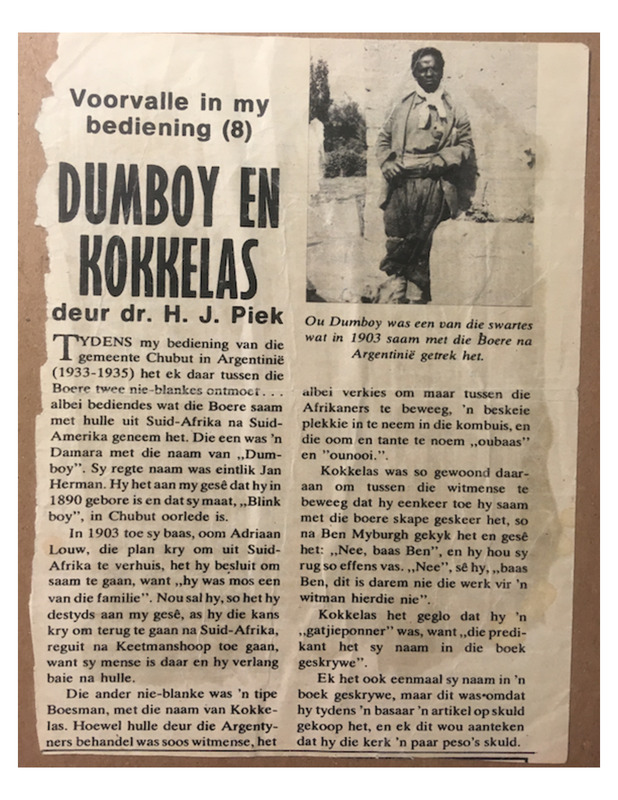-
Title
-
Dumboy en Kokkelas (1978, Afrikaans)
-
Dumboy y Kokkelas (1978, afrikáans)
-
Description
-
An article by a minister in Chubut about two servants brought by the Boers in 1903 who remained part of the Afrikaans community in the 1930's.
Published 1978
-
Un artículo de un ministro en Chubut acerca de dos sirvientes traídos por los Boers en 1903, y que formaron parte de la comunidad afrikaans en la década de 1930.
Publicado 1978
-
Creator
-
Piek, H. J.
-
Date
-
1978-07
-
Format
-
Periodicals
-
Language
-
Afrikaans
-
Publisher
-
Voorligter
-
Source
-
Du Toit Collection
-
Subject
-
Argentina
-
South Africa
-
Race
-
Type
-
Text
-
Text
-
Translation (Andries Coetzee):
"During my service in the congregation Chubut in Argentina (1933-1935), I encountered two non-whites between the Boers ... both of them servants whom the Boers brought with them from South Africa to Argentina. One of them was a Damara [AWC: member of a Khoisan tribe] with the name "Dumboy". His real name, however, was Jan Herman. He told me that he was born in 1890, and that his companion, "Blink boy" [AWC: "Shiny boy"], died in Chubut.
In 1903 when his master, uncle Adriaan Louw [AWC: "uncle" is used in Afrikaans as a general term of respect for an elder], decided to leave South Africa, he decided to go along, because, "he was one of the family, after all". Now he will, as he told me back then, if given the chance return to South Africa, go straight to Keetmanshoop, since that is where his people are and he misses them very much.
The other non-white person was some kind of Bushman [AWC: member of a Khoisan tribe], with the name Kokkelas. Although they were treated by the Argentinians like white people, both of them preferred to stay close to the Afrikaners, to occupy a humble position in the kitchen, and to call the uncle and aunt "old boss" and "old mistress ". [AWC: "uncle" and "aunt" are used in Afrikaans as general terms of respect for one's elders, similar to English Mr. and Mrs. "Old boss" and "old mistress" are terms that were used only by non-whites to refer to white people. The Afrikaans word "baas" (boss) also means "owner". These terms are most likely holdovers from the times of slavery.]
Kokkelas was so used to moving about white people, that once while shearing sheep with the Boers, he looked at Ben Myburgh and said: "No, boss Ben, this is not a white man's job."
Kokkelas believed that he was a "gatjieponner" [AWC: nickname for members of the Dutch Reformed Church], because "the minister wrote his name in the book".
I also once had occasion to write his name in a book, but that was because he wanted to purchase something on credit during a church bake sale [AWC: or "fair"], and I wanted to make a note that he owed the church a few pesos."
Photo Caption: "Old Dumboy was one of the blacks who moved to Argentina with Boers in 1903"
-
Location
-
South Africa
-
Tag
-
Church
-
Early Settlement
-
Race/ethnicity
-
Bibliographic Citation
-
"Dumboy en Kokkelas (1978, Afrikaans)," accessed [date], https://aacollabarchive.humin.lsa.umich.edu/s/aacollabarchive/item/11

